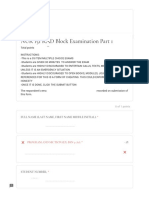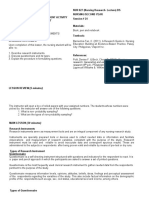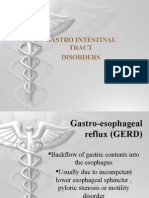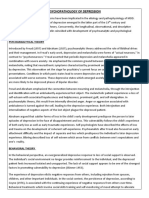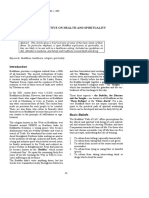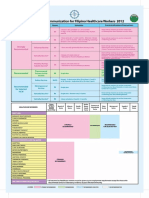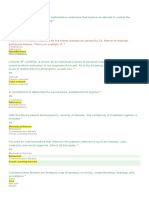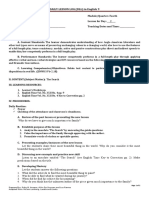SAS #22a Reading ENG 189 Swu
SAS #22a Reading ENG 189 Swu
Uploaded by
miaaCopyright:
Available Formats
SAS #22a Reading ENG 189 Swu
SAS #22a Reading ENG 189 Swu
Uploaded by
miaaCopyright
Available Formats
Share this document
Did you find this document useful?
Is this content inappropriate?
Copyright:
Available Formats
SAS #22a Reading ENG 189 Swu
SAS #22a Reading ENG 189 Swu
Uploaded by
miaaCopyright:
Available Formats
BACOR, CHRISTOPHER G.
BSN 3-A2
Lesson title: Cycle 6, Reading Session: Summarizing Materials:
Techniques References:
https://www.colorincolorado.org/artic
le/reading-comprehension-strategies-
Lesson Objectives:
english-language-learners
1. To recall techniques in summarizing texts. https://www.ereadingworksheets.com
2. To apply techniques in summarizing texts. /free-reading-worksheets/reading-
3. To self-evaluate needs in reading comprehension comprehension-
skills. worksheets/summarizing-
worksheets-and-activities/
Welcome to Cycle 6! You have finally reached the last cycle. We start with a Reading Session. As
always, go through your SAS as study guides. Keep up the good work!
Productivity Tip: At the end of the day, make sure your tasks have been carried out, and if
they haven't, put them back on your to-do list. Carry them out on the next day according to
their priority, but try not to fall behind!
A. LESSON TARGETS
Read: Lesson targets are skills and knowledge you want to be able to accomplish at the end of
the session.
Keep today’s lesson targets in mind as we go through today’s session:
To highlight important information and summarize texts.
To complete answering a reading comprehension practice test in 45 minutes
To reflect and list the kind of comprehension skills I need to work on
ENG 189, Session #22, 1
THIS DOCUMENT IS PROPERTY OF PHINMA EDUCATION
B. LESSON REVIEW/PREVIEW
What are the 5 strategies that will improve your summarizing skills?
1. Good grammar
2. Analysis
3. Technicalities
4.
5.
C. DEVELOPING THE SKILL
Activity 1: Instructions: Read each passage. Highlight or underline necessary information.
Write your summary.
1. If you are reading this right now, you are
taking part in the wonder of literacy. Because
of printed words, people can send information
across both time and space. Ideas are put in
writing and sent to readers across thousands
of miles and years. Because of writing, the
words of distant people can influence events,
offer knowledge, and change the world. Much
of the credit for the development of this
phenomenon can be attributed to one man.
2. Johannes Gensfleisch zur Laden zum
Gutenberg, better known as Johannes
Gutenberg, was born in the German city
of Mainz. Though most of Gutenberg’s early
life is a mystery, historians believe that he
studied at the University of Erfurt in 1418 and
spent much of his young adult life practicing
the profession of his father: goldsmithing.
Gutenberg borrowed money from investors in
1439 and found himself in financial trouble.
ENG 189, Session #22, 2
THIS DOCUMENT IS PROPERTY OF PHINMA EDUCATION
3. In the year 1439 the city in which Gutenberg
lived was planning to exhibit its large collection
from Emperor Charlemagne (a famous ruler
who had united much of Western
Europe around 800 AD). The exhibit was
expected to bring many visitors to the town, so
Gutenberg took investments and created
polished metal mirrors which were to be sold
to the visitors (it was a common belief at that
time that mirrors were able to capture holy
light from religious relics). The mirrors which
Gutenberg produced probably would have sold
well, but due to severe flooding the event was
delayed by one year. The impatient investors
demanded that Gutenberg return their
investments, but he had already spent the
money on producing the unsaleable mirrors.
He was trapped in a difficult situation.
Gutenberg decided to share his greatest secret
with them.
4. This secret would forever change the world,
all of history, and even the process of keeping
history. It’s been argued that Gutenberg’s idea
was one of the greatest of all mankind. This
one idea would lead to the spread of countless
others. It would play a key role in the
development of the Renaissance, Reformation,
the Age of Enlightenment, and the Scientific
Revolution. This idea would bring learning to
the masses. Gutenberg had created the
mechanical printing press with movable type.
ENG 189, Session #22, 3
THIS DOCUMENT IS PROPERTY OF PHINMA EDUCATION
5. Before the spread of Gutenberg’s idea,
literature was handwritten. That means that
each copy of the bible and all of its 73 books
were tediously hand scribed, and this was done
before the invention of the ballpoint pen. Given
the amount of detail that went into each text,
creating a single copy of a bible could take
years. Because of the effort that went into
producing them, books were extremely rare
and valuable. Because of the value of books,
there was little reason for common people to
learn to read or write since it was unlikely that
they would ever handle a book in their
lifetimes. Gutenberg’s invention would change
that. His printing press allowed literature to be
produced on a mass scale. His movable metal
type could be arranged once to form a page,
and he could print the page again and again.
✓ Example answers found on the last page of this activity sheet.
Activity 2: Practice Test (25 mins)
Activity 2.1. Reading Comprehension Test
1. When you are ready, flip to the Reading Test found at the end this SAS.
2. Read the test materials carefully and answer the questions as best as you can. Work only on
questions #1-21.
3. Write the letter of your answers in the “answer sheet” below.
4. Time yourself. After 20 mins, finished or not, stop working and proceed to the next activity
which is checking your work.
ENG 189, Session #22, 4
THIS DOCUMENT IS PROPERTY OF PHINMA EDUCATION
Score: ____________
1. A 11. B 21. C
2. C 12. D 22.
3. C 13. D 23.
4. D 14. A 24.
5. A 15. D 25.
6. D 16. B 26.
7. D 17. C 27.
8. B 18. B 28.
9. C 19. C 29.
10. B 20. A 30.
Activity 2.2. Checking your work
1. Turn to the reading test answer key and check your work.
2. Give yourself 1 point for every correct answer. Write your score.
3. Study the explanation for answers, especially for answers that you got wrong. This will guide
your thinking for the next practice test.
D. THINKING ABOUT LEARNING
My Learning
Think about the following:
1. How are reading comprehension skills important to you and your professional goals?
_______________________________________________________________________________________
_______________________________________________________________________________________
_______________________________________________________________________________________
2. What are two things you can do to continue to improve your comprehension skills?
_______________________________________________________________________________________
_______________________________________________________________________________________
_______________________________________________________________________________________
ENG 189, Session #22, 5
THIS DOCUMENT IS PROPERTY OF PHINMA EDUCATION
You are done with the final lesson for ENG 189!
You did it! The time and effort you exerted in your lessons, activities, and tests provided
you more knowledge and skills to enrich your English Communication skills. Continue to
read not only for your academic and professional needs, but also for leisure so you can
widen your vocabulary and upgrade your grammar. Challenge yourself to write more
and speak more, especially in formal presentations. Listen to others intently and take
advantage of feedback from your mentors and peers to help hone your communication
skills. Good reading, listening, speaking and writing skills are important to your success.
* Important: Make sure all your submissions are complete. Connect with your teacher for any
missed quizzes and deadlines. Prepare for the final assessments.
KEY TO CORRECTIONS
Example Answers:
1. Text is a powerful way to communicate. One man made a large contribution to literacy.
2. Gutenberg went to college and followed a trade but wound up in debt.
3. Gutenberg made an investment that backfired due to natural events. He shared a
secret with his investors.
4. Gutenberg created movable type.
5. Books were very expensive to produce until Gutenberg’s invention made them more
affordable.
ENG 189, Session #22, 6
THIS DOCUMENT IS PROPERTY OF PHINMA EDUCATION
You might also like
- Final P1 Research With AnsDocument18 pagesFinal P1 Research With AnsmiaaNo ratings yet
- Cooa Rbe LecDocument46 pagesCooa Rbe LecmiaaNo ratings yet
- Lesson 2 - Defining The Research ProblemDocument10 pagesLesson 2 - Defining The Research ProblemMarkNo ratings yet
- Aminophylline GuidelinesDocument2 pagesAminophylline GuidelinesChristian Reza100% (1)
- Oral Presentation RubricDocument2 pagesOral Presentation RubricVictoria De Lera Alonso100% (2)
- WISC-IV Subtest DescriptionsDocument2 pagesWISC-IV Subtest DescriptionsNeneng Wulandari67% (3)
- SAS - Session-24-Research 1Document5 pagesSAS - Session-24-Research 1ella retizaNo ratings yet
- SSP Week 8 - RetizaDocument4 pagesSSP Week 8 - Retizaella retizaNo ratings yet
- AA - Activity 2Document1 pageAA - Activity 2Nathaniel LaranjoNo ratings yet
- First Quiz in Gen 004 Coverage Days 1 5Document10 pagesFirst Quiz in Gen 004 Coverage Days 1 5Rezzan Joy MejiaNo ratings yet
- Cardiovascular Conditioning Monitoring ChartDocument2 pagesCardiovascular Conditioning Monitoring ChartDanielle Patricia Valencia OtedaNo ratings yet
- GitDocument302 pagesGitjgcriste100% (7)
- CHN 2 Session 5 SASDocument11 pagesCHN 2 Session 5 SASrica sebabillonesNo ratings yet
- Case Scenario NCPDocument2 pagesCase Scenario NCPDarwin QuirimitNo ratings yet
- Psychopathology of DepressionDocument3 pagesPsychopathology of DepressionAnanyaNo ratings yet
- 7) Freshmen Sem 2 - Monitoring and Mentoring (B3) - SASDocument2 pages7) Freshmen Sem 2 - Monitoring and Mentoring (B3) - SASIsabelle BitayNo ratings yet
- Drug Study Ready TEMPLATEDocument1 pageDrug Study Ready TEMPLATECezanne CruzNo ratings yet
- GordonDocument6 pagesGordonKristine Joy EbordeNo ratings yet
- A Buddhist Perspective On Health and SpiritualityDocument3 pagesA Buddhist Perspective On Health and Spiritualityedi_wsNo ratings yet
- Module 2 - Case 1Document9 pagesModule 2 - Case 1Joselyn M. LachicaNo ratings yet
- Introduction To Community Health Nursing ExposureDocument33 pagesIntroduction To Community Health Nursing ExposureRay LaderaNo ratings yet
- Sas #8Document4 pagesSas #8chennielafleurNo ratings yet
- D50WDocument1 pageD50WElizalde Husband100% (1)
- Peros: General AssessmentDocument4 pagesPeros: General AssessmentKaycee TolingNo ratings yet
- Case Analysis in Patient With Undifferentiated SchizophreniaDocument30 pagesCase Analysis in Patient With Undifferentiated SchizophreniaSolsona Natl HS MaanantengNo ratings yet
- Journal Diabetes MellitusDocument11 pagesJournal Diabetes Mellitusnabila noorNo ratings yet
- 3 Chapter V-CONCEPT-ON-ORGANIZATIONAL-MANAGEMENT-finalDocument20 pages3 Chapter V-CONCEPT-ON-ORGANIZATIONAL-MANAGEMENT-finalMariane DacalanNo ratings yet
- CHN Session 4Document2 pagesCHN Session 4Abegyl Nicole FiguraNo ratings yet
- SAS #20 Speaking ENG 189 SwuDocument8 pagesSAS #20 Speaking ENG 189 SwumiaaNo ratings yet
- Atkin's Case B4Document3 pagesAtkin's Case B4Windi Dawn Salleva50% (2)
- Public Health Nurse Nursing ProceduresDocument9 pagesPublic Health Nurse Nursing ProcedureskzbreakerrNo ratings yet
- Maam Gail M9 - Continuing Professional Devt (But M10 in MarilagDocument39 pagesMaam Gail M9 - Continuing Professional Devt (But M10 in MarilagxtnreyesNo ratings yet
- Metro Manila Development Screening TestDocument3 pagesMetro Manila Development Screening TestMae PonceNo ratings yet
- Political Caricatures and GrievancesDocument2 pagesPolitical Caricatures and GrievancesAshley BaldivinoNo ratings yet
- Try This! Directions: Answer All The Necessary Information Needed in The Column Below. UseDocument10 pagesTry This! Directions: Answer All The Necessary Information Needed in The Column Below. UseChristine Joy Molina100% (1)
- Exam Level IVDocument4 pagesExam Level IVRandy LinaoNo ratings yet
- Coa ReviewersDocument269 pagesCoa Reviewersmary ann corsanesNo ratings yet
- Home Visit PDFDocument4 pagesHome Visit PDFHannahleth GorzonNo ratings yet
- NCP FveDocument2 pagesNCP FveFortuna Grace AsuncionNo ratings yet
- Stages of Labor ADocument14 pagesStages of Labor AMaria Angela Viray100% (1)
- NCP Allergic RhinitisDocument2 pagesNCP Allergic RhinitisNurhidaya Jumala AhangNo ratings yet
- Buddy WorksDocument3 pagesBuddy WorksJamaica Leslie NovenoNo ratings yet
- CHN 2 Session 2 SASDocument6 pagesCHN 2 Session 2 SASrica sebabillonesNo ratings yet
- Recommended Immunization For Filipino Healthcare Workers 2012Document1 pageRecommended Immunization For Filipino Healthcare Workers 2012SMRNo ratings yet
- Teaching PlanDocument15 pagesTeaching PlanBlue Angel100% (2)
- 105 - Factors Influencing Drug ActionDocument4 pages105 - Factors Influencing Drug ActionCharisa Antonette HuelvaNo ratings yet
- COPARDocument34 pagesCOPARCJ AngelesNo ratings yet
- Family BackgroundDocument3 pagesFamily BackgroundPixel DinibitNo ratings yet
- Im Case Study 04Document49 pagesIm Case Study 04Shaine BalverdeNo ratings yet
- A Descriptive Research On The Diocese of Kalookan Salubong Rehabilitation ProgramDocument78 pagesA Descriptive Research On The Diocese of Kalookan Salubong Rehabilitation ProgramRogerGalangueNo ratings yet
- Week 1: 1/1 ComplianceDocument12 pagesWeek 1: 1/1 ComplianceJerald Ginn OrtizNo ratings yet
- Terminal Competency Rle - BSN - Level III Midterm For PrintingDocument13 pagesTerminal Competency Rle - BSN - Level III Midterm For PrintingDerek WhyndhamNo ratings yet
- Assessment: Nutrition Diagnosis Nutrition Intervention Monitoring and Evaluation of Nutritional Status Goals: Goals MetDocument3 pagesAssessment: Nutrition Diagnosis Nutrition Intervention Monitoring and Evaluation of Nutritional Status Goals: Goals MetIvan PogiNo ratings yet
- Ateneo de Zamboanga University: Case Study (HOSPITAL)Document7 pagesAteneo de Zamboanga University: Case Study (HOSPITAL)Lyka SaysonNo ratings yet
- AssignmentDocument1 pageAssignmentbillrn21No ratings yet
- Anatomy and Physiology of Stomach2Document3 pagesAnatomy and Physiology of Stomach2api-3718174100% (1)
- Drug StudyDocument2 pagesDrug StudyNathalia CabalseNo ratings yet
- Pedia Rotation Shifting Exam CRNDocument41 pagesPedia Rotation Shifting Exam CRNJohannah MayNo ratings yet
- Sample TCP - GraceGuitguitenDocument4 pagesSample TCP - GraceGuitguitenLauren JalandoniNo ratings yet
- Practice Test Funda CHNDocument11 pagesPractice Test Funda CHNFrancis Emman SantiagoNo ratings yet
- The Ride of Your Life: What I Learned about God, Love, and Adventure by Teaching My Son to Ride a BikeFrom EverandThe Ride of Your Life: What I Learned about God, Love, and Adventure by Teaching My Son to Ride a BikeRating: 4.5 out of 5 stars4.5/5 (2)
- Ruby DLL Q4 L2 D2Document2 pagesRuby DLL Q4 L2 D2Heart SophieNo ratings yet
- ENG 189 - SAS#14 - Reading - 2324Document6 pagesENG 189 - SAS#14 - Reading - 2324yuto.daan.swuNo ratings yet
- GE5183 Enseñanza Del Inglés - 2010 - EducaciónDocument38 pagesGE5183 Enseñanza Del Inglés - 2010 - EducaciónEmily A Espinoza ArtolaNo ratings yet
- Manifesting Mao Ni Mang Gawas PDFDocument30 pagesManifesting Mao Ni Mang Gawas PDFmiaaNo ratings yet
- Final Exam QuestionsDocument21 pagesFinal Exam QuestionsmiaaNo ratings yet
- RAD MS Nursing Long ExamDocument16 pagesRAD MS Nursing Long ExammiaaNo ratings yet
- Research Practice QuestionsDocument18 pagesResearch Practice QuestionsmiaaNo ratings yet
- SAS #20 Speaking ENG 189 SwuDocument8 pagesSAS #20 Speaking ENG 189 SwumiaaNo ratings yet
- SAS #22c Explanations - ENG 189 - SwuDocument4 pagesSAS #22c Explanations - ENG 189 - SwumiaaNo ratings yet
- Eng 189 P2Document11 pagesEng 189 P2miaaNo ratings yet
- SAS #21 Listening ENG 189 FRDocument14 pagesSAS #21 Listening ENG 189 FRmiaaNo ratings yet
- SAS #12 Speaking ENG189 SwuDocument6 pagesSAS #12 Speaking ENG189 SwumiaaNo ratings yet
- 2025 Bursary Application FormDocument6 pages2025 Bursary Application Formphakisho70No ratings yet
- Advert Programme Specialist Jp11 EeDocument1 pageAdvert Programme Specialist Jp11 EeAziz Ally AbbuNo ratings yet
- Collaborative PlanningDocument15 pagesCollaborative Planningdeeptiv2004No ratings yet
- SHS Focal Person Annual Work PlanDocument2 pagesSHS Focal Person Annual Work PlanMichael Lorenzo100% (1)
- List of Colleges and Institutes in Madurai DistrictDocument20 pagesList of Colleges and Institutes in Madurai DistrictabinandhansudakarNo ratings yet
- Unit 2 Performance Assessment - Written ReportDocument18 pagesUnit 2 Performance Assessment - Written ReportKayla Albay100% (1)
- Chapter 1 - NSTP Program (RA 9163)Document4 pagesChapter 1 - NSTP Program (RA 9163)Eric John About-ModillasNo ratings yet
- Building Technology and Design Syllabus: Forms 1 - 4Document52 pagesBuilding Technology and Design Syllabus: Forms 1 - 4Anotidaishe Nyakudya100% (1)
- Complete The Conditional: Activity TypeDocument3 pagesComplete The Conditional: Activity TypeDIY TaskerNo ratings yet
- FIA AD ApplicationDocument2 pagesFIA AD Applicationkashif afridiNo ratings yet
- Department of Education: Weekly Home Learning Plan For Grade 4Document10 pagesDepartment of Education: Weekly Home Learning Plan For Grade 4June Jay MangenteNo ratings yet
- Letter 2Document2 pagesLetter 2Engr MumtazNo ratings yet
- Research Thesis - MR R U Tjazapi - BEd Hons - IOLDocument36 pagesResearch Thesis - MR R U Tjazapi - BEd Hons - IOLUrikee TjazapiNo ratings yet
- The Role of TeacherDocument4 pagesThe Role of TeacherAguez MaulanaNo ratings yet
- Performance Appraisal FormDocument7 pagesPerformance Appraisal FormShaharyar Sheikh100% (1)
- Front Page Portfolio FinalDocument10 pagesFront Page Portfolio Finalapi-678949602No ratings yet
- Teacher Guide Grade 3Document240 pagesTeacher Guide Grade 3api-407099013No ratings yet
- Rotary and Goodwill Can Continue To Strengthen Communities and FamiliesDocument25 pagesRotary and Goodwill Can Continue To Strengthen Communities and FamiliesEco SuperiorNo ratings yet
- A) Reading StrategiesDocument15 pagesA) Reading Strategiessaifulazwan_19100% (1)
- CSC Job Portal: Mgo Mamasapano, Maguindanao - BarmmDocument1 pageCSC Job Portal: Mgo Mamasapano, Maguindanao - BarmmWilmer EudNo ratings yet
- DLL Week 2Document2 pagesDLL Week 2Myra Dacquil Alingod100% (9)
- Amity University Lateral Admission Application Form InstructionsDocument6 pagesAmity University Lateral Admission Application Form InstructionsHemant KumarNo ratings yet
- Ial Summer 2025 FinalDocument23 pagesIal Summer 2025 FinalADINo ratings yet
- FP009 Trabajo CO Eng - v1r0Document10 pagesFP009 Trabajo CO Eng - v1r0Giselle Spadoni Teixeira100% (1)
- Gr2 Te Guide T1 2020Document300 pagesGr2 Te Guide T1 2020MagedYousefHabielNo ratings yet
- Parent Information Night ScriptDocument3 pagesParent Information Night Scriptapi-350026931No ratings yet
- Melissa Courtney Leadership ResumeDocument3 pagesMelissa Courtney Leadership Resumeapi-253426463No ratings yet
- Pemikiran Pendidikan Ki. Hajar Dewantara Dan Relevansinya Dengan Kurikulum 13Document30 pagesPemikiran Pendidikan Ki. Hajar Dewantara Dan Relevansinya Dengan Kurikulum 13ranti panguNo ratings yet

